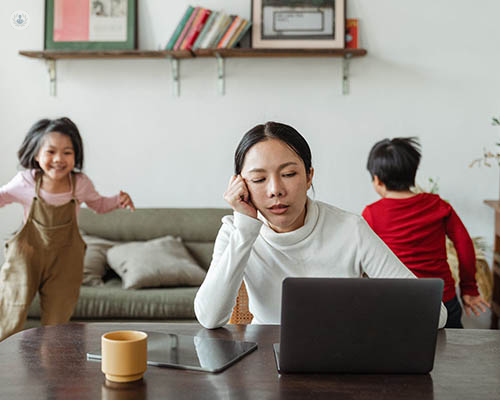COVID-19 and burnout whilst working from home - here’s what to do!
Autore:If you are struggling to separate your work and home life as a result of working from home during the pandemic, then inevitably, you may be feeling exhausted and drained. This is especially true because we live in such a connected world, that the temptation of answering an email notification on your phone after you’ve clocked out for the day is all too easy.
Here, one of our expert psychiatrists Dr Sunil Raheja explains everything you need to know about burnout and shares his tips on how to overcome it.

What is burnout?
Burnout is a combination of three things over a period over time; physical and emotional exhaustion, feelings of cynicism and detachment, and thirdly feelings of ineffectiveness and lack of accomplishment. Let’s look at how these present:
Physical and emotional exhaustion – you may be lacking in energy, feeling poorly and not giving proper attention to tasks that need to be done.
Feeling of ineffectiveness – you may focus on the negative aspects of life and feel disconnected from others. You start to attribute ulterior motives to other people, and negatively look at what other people are doing and why. An example of this would be withdrawing from relationships.
Sense of lack of accomplishment – you may be going through the motions throughout the day, feeling like everything is a burden and a struggle. Before you went through the day without thinking and got on with your daily work tasks, but now you may be questioning “what is the point of this?”.
What are the main stages of burnout?
Burnout is an ongoing form of chronic stress. Normally, during periods of stress our bodies respond in terms of ‘fight or flight’, so if something happens you quickly deal with it, but it means that your adrenaline and cortisone (stress) levels rise. With burnout, however, it is more like a ‘drip, drip’ kind of effect, which gradually, over time, begins to wear you down.
Why are people experiencing burnout during the pandemic?
There a number of factors as to why some people may experience burnout during the pandemic. Firstly, there has been a significant change in our routines and the way that we live and work, which isn’t like something that we may have experienced before.
We have also lost these natural boundaries between work and home life. If you are living on your own, a lot of the things that you have relied on for your own peace of mind or encouragement, or the things that fulfil you, have been taken away. It feels as though the days are merging into one another.
The problem is that technology has become our enemy. We no longer have any balance. When do you stop doing things? When do you switch off from emails? There is no end to it. The more you do, the more you create. There is always another email to do. Before we had a finish line at 6 pm, we would turn off our computer and commute home to enter a different world.
How can I tell if I am experiencing burnout whilst working from home?
It’s in noticing this sense of loss of enthusiasm for what you’re doing. The things that you enjoyed about work now have a great sense of sameness about it.
There is a difference between burnout and depression. With depression comes low moods that affect everything you do whereas with burnout, if you stayed connected with a good friend or took a walk outside in nature, for example, you can get things in perspective. Burnout is linked to your work as opposed to your life and you may feel that there is less and less meaning that previously made your job fun or interesting to do.
We also need to have face to face interaction with our colleagues.
Technology is a useful tool for allowing us to stay in touch, for example with a meeting over Zoom or over the phone, but it is different to being physically present with someone. Technology is a compliment, but it can’t replace human interaction and we can only handle it for a week or two. Spending a lot of time on our screens doesn’t help our mood or energy. Work, social media and news channels are all on the same screen. We need to switch off.
What are some of your top tips for overcoming burnout during the pandemic?
We need to focus on self-care and make our physical and psychological health a priority. There’s importance in switching off, living away from screens and reconnecting face to face with people (if you can and whilst adhering to current COVID-19 regulations). You can do simple things, such as:
- Getting out and going for walks
- Doing exercise
- Switching off your devices an hour before you go to bed
- Getting rest and slowing yourself down
- Taking up a hobby
- Fun tasks, such as cooking, playing a card game etc.
- Reconnect with your body
- Create boundaries to avoid the dangers of overcommitment and taking too much on.
Overall, it’s important to find something that connects you to the present moment and remember that you are a human being, not a human doing.
What positives can we take away?
We can look at this as a growth opportunity, which is pointing to something deeper. As a lot of our structure has been taken away, we may be left questioning “do I need to go into the office five days a week?”. It is essential to have the right combination of being in the office and working from home because both have positive and negative aspects, which should be met in the middle to create balance.
But you may have more fundamental questions about your career such as “is this what I really want to do?” and “what really matters to me?”. I advise that you find a safe space and discuss these feelings with your family or friends.
As a psychiatrist that’s also a part of the service I offer. My ‘Dancing With Wisdom’ coaching program explores these feelings you may be facing. We can work together and look at how you can grow and develop so you can come through this stronger than ever before.
If you are feeling burnt out and need someone to talk to, you can book an appointment with Dr Raheja via his Top Doctor’s profile here. Dr Raheja is available for a video call using our e-Consultation tool which can be found on his profile.
More information on the services Dr Raheja offers is available here. He is currently only offering online consultations with a small number of patients via a waiting list. You can complete a pre-consultation form here.


